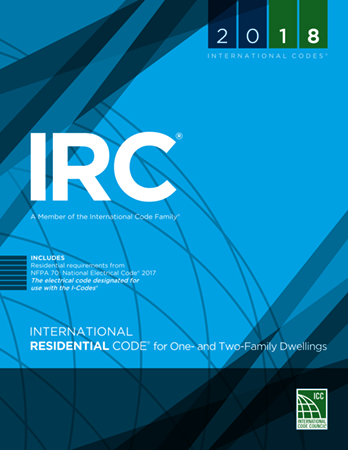
The International Residential Code
Overview of the International Residential Code® (IRC®)
Internationally, code officials recognize the need for a modern, up-to-date residential code addressing the design and construction of one- and two-family dwellings and townhouses not more than three stories above grade. The International Residential Code is designed to meet these needs through model code regulations that safeguard the public health and safety in all communities, large and small.This comprehensive, stand-alone residential code establishes minimum regulations for one- and two-family dwellings and townhouses using prescriptive provisions. It is founded on broad-based principles that make possible the use of new materials and new building designs. This 2018 edition is fully compatible with the Family of International Codes.
Benefits of the IRC:
- The IRC contains a complete set of code provisions, covering all aspects of construction in a single source, including:
- Building
- Energy conservation
- Plumbing
- Mechanical
- Fuel gas provisions included through an agreement with the American Gas Association
- Electrical provisions from the 2017 National Electrical Code® (NFPA 70)
- The principles of the IRC are based on protection of public health, safety and welfare.
- The IRC results in efficient designs that provide flexibility for the code official, designer, engineer and architect.
- Provisions of the code encourage the use of new and smarter technological advances.
- The IRC emphasizes both prescriptive and engineered solutions and allows the use of time-tested methods.
- The IRC references nationally developed consensus standards.
Today's IRC is known for:
- Safety – It provides prescriptive requirements for framing and foundations as well as a proven track record providing safe and sanitary plumbing installations.
- Ease of Use – The IRC uses the same easy-to-use format provided in all I-Codes.
- Embrace of New Technology - The IRC and its predecessors have a tradition of innovation while protecting the health and safety of the public.
- Correlation – The IRC is specifically correlated to work with ICC's family of codes.
- Open and Honest Code Development Process - The IRC is revised on a three year cycle through ICC's highly-respected consensus code development process that draws upon the expertise of hundreds of plumbing, building and safety experts from across North America.
Code Development
Current Version: 2018 IRC
- Purchase the newest edition of the code and references.
Upcoming Version: 2021 IRC Development
The International Residential Code provisions provide many benefits, among which is the model code development process that offers an international forum for residential construction professionals to discuss prescriptive code requirements. This forum provides an excellent arena to debate proposed revisions.
- Get the 2021 code development schedule.
- Learn more about ICC's web-based code development process, cdpACCESS.
Adoptions of the IRC
The International Residential Code (IRC) is in use or adopted in 49 states, the District of Columbia, Guam, Puerto Rico and the U.S. Virgin Islands.
As a model code, the IRC is intended to be adopted in accordance with the laws and procedures of a governmental jurisdiction. When adopting a model code like the IRC, some jurisdictions amend the code in the process to reflect local practices and laws.

